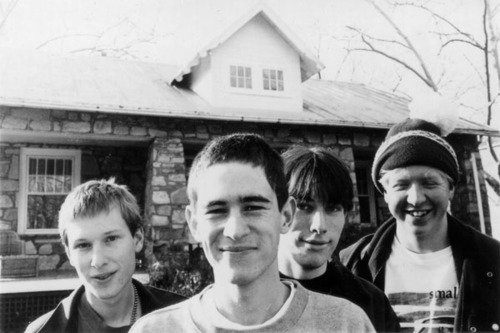We’ve definitely segued into a period of 90s revivalism — chances are, if you’re not scouring for a vintage Moog to record that tripped-out space journey, you’ve rediscovered the fuzz pedal. That’s cool and all, but I often wish that bands would reference the dynamic guitar-based scene of Chapel Hill more than, say, the fuzz of the West Coast — that is, to be influenced by the types of bands that were more likely to break guitar strings from bending or detuning, rather than fussing over the maintenance of that correct fuzz setting.
Of course, it’s not just revivalism; many decade-defining indie rock records have recently seen the reissue treatment, which is a nice invitation for re-examination. And while I’m glad to see Merge reissue Superchunk’s Foolish and Archers of Loaf’s Icky Mettle (both archetypal records of 90s Chapel Hill indie rock), there’s still one record from the same area and time period that I doubt will see the proper reissue (and acclaim) it deserves.
The Raymond Brake, from Greensboro, NC (just West of Chapel Hill), released an album in 1995 called Piles of Dirty Winters. To be slightly reductive, this four-piece combined the dynamic, bent guitar style of Polvo with the energetic drive and pop sense of Superchunk. I also hear a vaguely D.C.-ish influence at times, but more on the end of Pitchblende than Fugazi. Hooky, varied, and rewarding to revisit, Piles of Dirty Winters is one of the finest lost albums of the 90s, and is most certainly a discography highlight from the similarly overlooked Arlington, VA label, Simple Machines.
The Raymond Brake’s music can sometimes be reflective of the band members’ ages (at the time they were all 20 and 21, according to Simple Machines), but I don’t mean this to be a slight. Their ideas about guitars, melodic layering, and tempo dynamics often showed considerable confidence, making several of their songs rewarding to figure out. The band was also able to provide variety: “Laying Down” has the nascent drawl of 20-something malaise merged with slow-moving, woozy guitars; “The Long Sleep” is a bedroom-folk song, and “Shooting in the Dark” builds to post-hardcore catharsis.
“Philistine” opens the album with descending guitar interplay that morphs into Superchunk territory, but with a more fractured guitar approach than the ‘chunk tended to engage in. The subtle vocal harmonies and alternately restrained/loose guitar interplay make “Philistine” an effective album opener, essentially introducing the core elements of the band’s sound in a just-ragged-enough package.
“New Wave Dream” was the single — their “Web in Front,” their “Tilebreaker.” Built around start/stop rhythms, dynamic guitars, and a quintessentially 90s guitar break in the bridge, the song is a high point on this lost gem of an album. It’s all inescapably 90s (the embedded video definitely hasn’t aged as well; that hair!) yet it doesn’t strike me as dated or particularly naïve. If anything, it encapsulates a moment in guitar-based indie rock that doesn’t get referenced in quite the same way anymore.
Fans of 90s Chapel Hill — especially Polvo — or indie rock at all should seek out Piles of Dirty Winters. The Raymond Brake were shortlived, releasing only a few singles, Piles of Dirty Winters, and Never Work Ever, a messy EP from 1996. There was an unreleased LP as well, one that sometimes hits the highs of their best work but lacks the front-to-back consistency which makes Piles worth returning to. Frontman Andy Cabic went on to form the folkier Vetiver, and all I can gather about the rest of the band is from last.fm and youtube comments — supposedly, one of the members now teaches high school history. I don’t know how likely it is that The Raymond Brake will see reissue treatment, but I can continue hoping.
